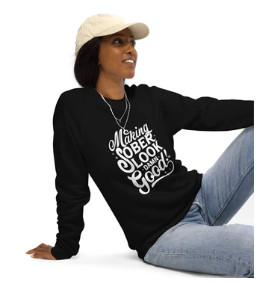Wicked, Recovery, and the Lessons That Heal
Sometimes healing doesn’t look graceful.
Sometimes it looks like Elphaba—bold, misunderstood, and walking away from everything she thought she wanted because the truth mattered more.
Other times, it looks like Glinda—smiling through her pain, craving connection, trying to get it right, and slowly learning that authenticity is more powerful than approval.
Both are valid. Both are part of the story. And both remind me of what we see every day in recovery.
Healing When You Didn’t Start From a Safe Place
Because so many of us didn’t get to start from a safe or loving place.
We carry the impact of things we didn’t choose—childhood trauma, family addiction, dysfunction, neglect.
The truth is the trauma of your childhood doesn’t get the final word.
And the sins of your parents are not your burden to carry.
At Today’s Sober Women, we talk a lot about showing up with our whole selves. That’s hard work. It means facing shame. It means peeling back the layers of who we’ve been performing as—and stepping into who we really are.
And if you know Wicked, you know exactly what I mean.
What Elphaba Teaches Us About Integrity and Wholeness
Elphaba leads with integrity—even when it costs her everything. She speaks up when something’s not right. She chooses honesty over performance. She’s not perfect—but she doesn’t fake it. That takes courage. That’s recovery.
What Glinda Teaches Us About Growth and Letting Go
Glinda starts off sparkly and eager to please. She wants to be loved and admired—and who hasn’t? She covers her insecurities with charm, success, and looking the part. But inside? She’s aching to be known.
Eventually, Glinda slows down. She listens. She grows. She lets herself feel. She learns how to love without needing control. That’s recovery, too.
Some of us enter recovery like Elphaba—strong-willed, skeptical, determined not to be defined by anyone else.
The Same Truth at the Heart of Healing
Some of us enter like Glinda—overachieving, polished, and secretly terrified we’ll fall apart if we stop performing.
But in the end, both characters discover the same truth: you can’t heal without being honest.
Not just with others. With yourself.
And you can’t lead others—or love them well—if you haven’t first learned to show up fully.
You Are Not Too Much to Be Whole
You are not too much—
not too emotional, too intense, too sensitive, or too complicated.
You haven’t missed your chance.
There’s still time to become who you’re meant to be.
And you don’t have to fake it to be free.
Supporting Those In Recovery

TSW Merchandise
Support women on the road to sobriety by purchasing something from our store! Every purchase makes a life in the life of a woman on her sobriety journey!


